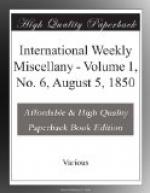To have explained the cause of her wretchedness would have been death indeed.
“I am going to give you a treat,” continued Leon. “A celebrated singer is to appear to-night in the theater. I will send you to hear her, and afterward you shall sing to me what you remember of her performances.”
Anielka went. It was a new era in her existence. Herself, by this time, an artist, she could forget her griefs, and enter with her whole soul into the beauties of the art she now heard practiced in perfection for the first time. To music a chord responded in her breast which vibrated powerfully. During the performances she was at one moment pale and trembling, tears rushing into her eyes; at another, she was ready to throw herself at the feet of the cantatrice, in an ecstacy of admiration. “Prima donna,”—by that name the public called on her to receive their applause, and it was the same, thought Anielka, that Justiniani had bestowed upon her. Could she also be a prima donna? What a glorious destiny! To be able to communicate one’s own emotions to masses of entranced listeners; to awaken in them, by the power of the voice, grief, love, terror.
Strange thoughts continued to haunt her on her return home. She was unable to sleep. She formed desperate plans. At last she resolved to throw off the yoke of servitude, and the still more painful slavery of feelings which her pride disdained. Having learnt the address of the prima donna, she went early one morning to her house.
On entering she said, in French, almost incoherently, so great was her agitation—“Madam, I am a poor serf belonging to a Polish family who have lately arrived in Florence. I have escaped from them; protect, shelter me. They say I can sing.”
The Signora Teresina, a warm-hearted, passionate Italian, was interested by her artless earnestness. She said, “Poor child! you must have suffered much,”—she took Anielka’s hand in hers. “You say you can sing; let me hear you.” Anielka seated herself on an ottoman. She clasped her hands over her knees, and tears fell into her lap. With plaintive pathos, and perfect truth of intonation, she prayed in song. The Hymn to the Virgin seemed to Teresina to be offered up by inspiration.
The Signora was astonished. “Where,” she asked, in wonder, “were you taught?”
Anielka narrated her history, and when she had finished, the prima donna spoke so kindly to her that she felt as if she had known her for years. Anielka was Teresina’s guest that day and the next. After the Opera, on the third day, the prima donna made her sit beside her, and said:—
“I think you are a very good girl, and you shall stay with me always.”
The girl was almost beside herself with joy.
“We will never part. Do you consent, Anielka?”
“Do not call me Anielka. Give me instead some Italian name.”
“Well, then, be Giovanna. The dearest friend I ever had but whom I have lost—was named Giovanna,” said the prima donna.




